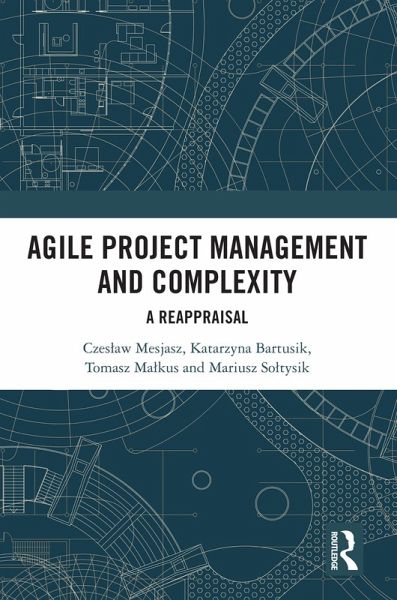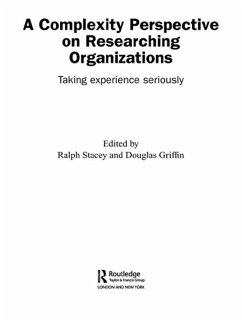
Agile Project Management and Complexity (eBook, PDF)
A Reappraisal
Versandkostenfrei!
Sofort per Download lieferbar
41,95 €
inkl. MwSt.
Weitere Ausgaben:

PAYBACK Punkte
21 °P sammeln!
This research monograph presents an inter-disciplinary study of the impact, and current status, of applications of complexity-related concepts in the early stages of development of Agile Project Management (APM). The results serve as an introduction for exploring more profound relations between complexity-related ideas and APM in the future.The increasing complexity of software projects and their environment in the 1990s constituted the main determinants of the development of the family of methodological frameworks called Agile Project Management. Development of APM has been shaped by a broadl...
This research monograph presents an inter-disciplinary study of the impact, and current status, of applications of complexity-related concepts in the early stages of development of Agile Project Management (APM). The results serve as an introduction for exploring more profound relations between complexity-related ideas and APM in the future.
The increasing complexity of software projects and their environment in the 1990s constituted the main determinants of the development of the family of methodological frameworks called Agile Project Management. Development of APM has been shaped by a broadly defined area of research called complexity science or complexity theory based on complex adaptive systems (CAS) and on their characteristics: Complexity, chaos, the edge of chaos, emerging properties, non-linearity, self-organization, etc. In the 21st century, due to the expansion of Agile beyond software development, the challenges deriving from the complexity of projects and the environment are even more urgent or compelling. Such phenomena demand more profound inter- and multi-disciplinary studies. This book examines the impact of applications of complexity-related ideas deriving from intuitive complexity and from complexity science in the early stages of development of the Agile methodological frameworks in project management and considers the current status of those applications. It questions the usefulness of those applications for the practice and theory of APM, and then proposes a conceptual framework for further theoretical studies and several ways of improvement and refinement of the Agile Project Management necessary to deal with broadly defined complexity in project management.
Requiring a medium-level knowledge of complexity studies and knowledge of project management, this book is written for the research community studying the links between the various methodological frameworks included in APM and complexity-related ideas. It will also be interesting for studies of the impact of complexity on modern management, and for master's students on IT and management courses.
The increasing complexity of software projects and their environment in the 1990s constituted the main determinants of the development of the family of methodological frameworks called Agile Project Management. Development of APM has been shaped by a broadly defined area of research called complexity science or complexity theory based on complex adaptive systems (CAS) and on their characteristics: Complexity, chaos, the edge of chaos, emerging properties, non-linearity, self-organization, etc. In the 21st century, due to the expansion of Agile beyond software development, the challenges deriving from the complexity of projects and the environment are even more urgent or compelling. Such phenomena demand more profound inter- and multi-disciplinary studies. This book examines the impact of applications of complexity-related ideas deriving from intuitive complexity and from complexity science in the early stages of development of the Agile methodological frameworks in project management and considers the current status of those applications. It questions the usefulness of those applications for the practice and theory of APM, and then proposes a conceptual framework for further theoretical studies and several ways of improvement and refinement of the Agile Project Management necessary to deal with broadly defined complexity in project management.
Requiring a medium-level knowledge of complexity studies and knowledge of project management, this book is written for the research community studying the links between the various methodological frameworks included in APM and complexity-related ideas. It will also be interesting for studies of the impact of complexity on modern management, and for master's students on IT and management courses.
Dieser Download kann aus rechtlichen Gründen nur mit Rechnungsadresse in A, B, BG, CY, CZ, D, DK, EW, E, FIN, F, GR, HR, H, IRL, I, LT, L, LR, M, NL, PL, P, R, S, SLO, SK ausgeliefert werden.













